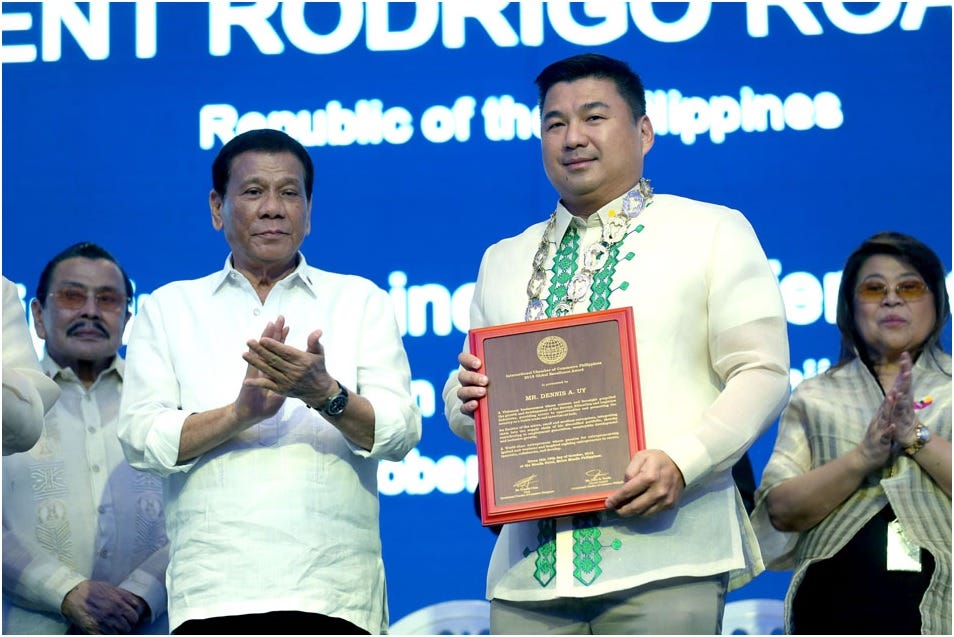[ad_1]

There seems no stopping China’s net from gradually enveloping not just the Philippine seas but its commercial entities. Within days of the swarm attack by some 220 Chinese militia vessels, thinly disguised as fishing boats, on Whitsun reef off Palawan, the Senate almost unanimously gave a 25-year telecom license to Dito Telecommunity, now probably effectively controlled by China Telecom, a mainland China state enterprise.
Dito is on paper controlled by Davao entrepreneur Dennis Uy and his interlocking Udenna and Chelsea Logistics and Infrastructure groups, with 60 percent compared with China Telecom’s 40 percent. However, the reality is that Uy is cash-strapped and only the Chinese side has the financial clout to come close to meeting the telecom network roll-out that it promised as conditions for the original license.
That was implicit from the start. While a largely supine Senate awarded the license to Uy, President Rodrigo Duterte’s fingerprints were all over the award. The country got an ugly preview of what was coming during Duterte’s State of the Nation address last July. Duterte at that time threatened the country’s two main telecom providers Globe, majority-owned by the Ayala Group, and Smart of the Metro-Pacific group, with expropriation if services didn’t improve. At the time, there was widespread speculation that the threat was aimed at clearing the way into telecommunications for Uy and his Chinese backers.
Now Uy’s whole enterprise is mired in debt and it is having to sell off assets to try to meet obligations. The group had grown dramatically from a Davao-based oil tankering and retailing business to a leading player in the inter-island shipping business, partly acquiring Negros Navigation from the Aboitiz Group. This was done in conjunction with China’s state-owned China-ASEAN Investment Cooperation Fund.
Then, combining political clout of proximity to Duterte, whose campaign he had supported, with access to a seemingly inexhaustible supply of borrowed money, Uy moved into hotels and a casino, the convenience store chain Family Mart, a Ferrari dealership, development rights at the Clark Freeport Zone, buying a 45 percent stake in the Malampaya gas field from Chevron and bidding for Shell’s 45 percent stake. He then acquired a dormant license-holder the Mindanao Islamic Telephone Company, Mistel, changing the name to Dito Telecommunity and joining with China Telecom to bid for a new national telecom license to compete with the two existing players.
Although several consortia with strong international partners expressed interest, because of doubt over the process, there were only three actual bidders, two of which were disqualified. Uy’s Dito and China won by default.
All may have seemed well until the Covid-19-induced economic downturn hit most of Uy’s operating businesses while Dito was still in the network build-out phase. Dito has now reportedly done enough in technical terms to justify the 25-year license, but doubts about its advisability on national security grounds remain and it will have further hurdles to jump, perhaps when Duterte is no longer in power.
As for Udenna, it has had to sell its 31 percent stake in 2Go Group, the former Negros Navigation, to the Sy family – the nation’s richest – and its majority stake in his original oil enterprise, Phoenix Petroleum is also up for sale.
The overall condition of Udenna is uncertain. As of the end of 2019, it was reportedly profitable but had a debt-to-equity ratio of 2.7 times. Results and balance sheet for 2020 are not yet available.
Some suggest that Uy could go the way of some of Marcos’ presidential cronies like Dewey Dee and Herminio Disini. But more likely the Chinese have invested too much in this link into a key part of the Philippine infrastructure to abandon him.
Both China and Uy must be relieved that China can continue its commercial embrace of the Philippines even as its militia takes effective control of another reef in the Philippines’ Exclusive Economic Zone without more than a mild diplomatic protest and in the absence of any naval presence by the Armed Forces of the Philippines supposed to defend the nation.
This article is among the stories we choose to make widely available. If you wish to get the full Asia Sentinel experience and access more exclusive content, please do subscribe to us.
[ad_2]
Source link